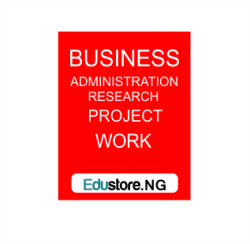CHAPTER ONE
INTRODUCTION
All aspects of accounting have arisen from practical necessity. Ever since the use of money replaces barter, people have been concerned with the term costs. Moreover, since trading began, enterprises have been alive to the importance of cost. This could not be otherwise since it is universal knowledge that profit equals sales minus costs. Management accounting gives the techniques of information generation such as cost and profitability of a project from previous plan.
Management accounting in all manner of business organisation is concerned with the provision or supply of relevant information to people within the organisation to assist them make better decision. It is involved in conventional and non-conventional thus require adequate and relevant information in decision situations.
Further, management accounting requires provision and understanding of the attributes of economic information and the process of identifying, measuring and disseminating this information.
Management accounting represents an application of professional skills and knowledge in the areas of cost analysis or cost accounting towards solving managerial problems and management decision-making process. In this respect the management accountant aims at developing both routine and non-routine relevant financial information tailored primarily to specific management functions, particularly those of planning and control.
Information is obtainable either by direct observation or by communication. Managers normally obtain information by communication it is not possible to observe all the activities taking place under their responsibility. In effect, management accounting should concentrate on the provision of relevant information that is valuable to the recipient. For instance, if a manager is considering alternative courses of action, both requires the use of existing machinery, then the flows (payment) for the item of the machinery will remain the same for both alternatives.
This information is not relevant to decision, because the cash flow remain unchanged for both alternatives. Only cash flows that will be different for the individual alternatives represent relevant management accounting information for the decision.
Relevant is centered at management accounting, if information is not relevant to it need, it has no value. Thus, it is important that, there is a close relationship between the management accounting and all level of management so that the management can be familiar with the firms’ operation and determine what is relevant in a marines that more precisely reflects the needs understand and receptive of particular users.
- STATEMENT OF PROBLEM
Usually organisation are expected to adopt management accounting and enjoy the inherent benefits towards enhancing the profitability of the organisation such benefits includes the ability to accumulate costs, to determine unit cost of their products, determine various having compared their actual costs and selling prices etc with budgeted figures and taken necessary decision toward correcting identified causes of variances.
However, most organisation failed to adopt management accounting because of their failure to appreciate the inherent benefit identified above.
1.2 OBJECTIVE OF THE STUDY
The main objective of this study is to determine the appropriateness or otherwise of the management accounting system in enhancing productivity.
In order to be able to form an opinion on this issue, I will initially examine how management accounting can help in cost control thereby helping in overall budget and analysis of cost of an organisation.
Also, in the evaluation of different ways the system can be used in achieving increased productivity in an organisation, and upon critical examination of these records, I will high light or pin-point weakness, if they actually exist and recommend probable alternative if any which will boost the company effective internal control.
1.3 PURPOSE OF THE STUDY
- To assist the management in promoting efficiency which includes best possible service to its customers, investors and employees.
- To formulate policy and planning
iii. To examine how management accounting can help in cost control thereby helping in overall budget and analysis of cost of an organisation.
- To determine the appropriateness or otherwise of the management accounting system in enhancing productivity.
- To ascertain the preparation of budget covering all aspect of business e.g. production, selling, distribution and finance etc.
- To highlight or pin-point weaknesses, if they actually exist and recommend probable alternative if any, which will boost the company effective internal control.
1.4 RESEARCH QUESTIONS
In order to achieve the aim of this study, questions must be asked pertaining to this research study and answer should follow tentatively.
- What enhance productivity in management accounting?
- Does good management accounting system reveal organisation weakness and strength in relation to productivity?
- If management accounting acts as a check and balance on the organisation will that bring effectiveness and efficiency in relation to production.
- Does management accounting system aid management in decision making process to enhance productivity?
- How does management accounting assist the management in promoting efficiency which includes best possible service to its customer, investors and employees.
1.5 STATEMENT OF THE HYPOTHESIS
This study will be subjected to some testable hypothesis.
HO: A good management accounting system does not enhance organizational productivity.
H1: A good management accounting system enhances organizational productivity.
Ho: A good management accounting system will not reveal organisation strength and weakness in relation to productivity.
H1: A good management accounting system will reveal organisation strength and weakness in relation to productivity.
HO: Management accounting system will not aid management decision making process to enhance productivity.
H1: Management accounting system aid management in decision making process to enhance productivity.
HO: Management accounting system will not act as a check and balance on the organizational effectiveness and efficiency in relation to productivity.
H1: Management accounting will act as a check and balance on the organizational effectiveness and efficiency in relation to productivity.
1.6 SIGNIFICANT OF THE STUDY
This study is relevant to all business enterprises as a whole. Specifically, the significant of this study may serve as a guide or a reminder to the management of West Africa Milk Company (Nig.) Plc for restoring, refitting, maintaining and recognizing the need for, and the indispensability of management accounting to have an edge over other milk companies.
The study could also serve as reference materials for future researchers on similar subjects of can even serve as a reference for staff and management of West Africa Milk Company (Nig.) Plc.
1.7 SCOPE/LIMITATION
The scope of this research work will be limited to the impact which management. Accounting system will have in the process of organizational productivity enhancement with special reference to West Africa Milk Company (Nig.) Plc.
The scope of this research work will be limited to the impact which management. Accounting system will have in the process of organizational productivity enhancement.
Basically, the research is restricted to manufacturing sector due to the underlisted hindrances with West African Milk Company (Nig.) Plc as a case study. Some of the problems encountered during the research work includes:
- Lack of co-operation of some respondents: There were some respondents who were not allowed for the conduction of personal interview with them, despite the assurance giving to them that their contributions will never be used in any way against them.
- Misconception of the objectives of the study: Most of the respondents thought the study was being bankrolled by management to identify some staff that may involved in fraud or embezzlement.
- Unavailability of some management staffs: It is impossible to carry out a study of this nature without encountering some difficulties especially when one has a cause to deal with the manager of an organisation. It is either the manager is not in the office or he would be attending a meeting or conference or for other reasons.
- Badly completed questionnaires: Some questionnaires were badly completed while some not returned at all.
- Indecisive: Some respondents were so indecive in responding to the questionnaires.
1.8 DEFINITION OF TERMS
Cost Analysis: Means the purpose of classifying and estimating the total amount of expenditure.
Cost: Is described as the total expenses that has already been incurred.
Report: Is the summary of historical financial activities over a period of time.
Controllable Cost: Item of cost that a decision maker can manipulate or control.
Fixed Cost: Cost that remains constant over a relevant range of volume.
Variable Cost: Cost that varies with the level of activities.
Cost Per Unit: The additional cost of producing one extract unit.
Profit: Additional income earn above expenditure.
Relevant Cost: Cost appropriate to aiding management decision making.
Opening Stock: Stock at the beginning of the year.
Closing Stock: Stock at the end of the financial year.
Uncontrollable Cost: Item of cost that cannot be manipulated or control.
DOWNLOAD COMPLETE WORK- For Reference Only: Materials are for research, citation, and idea generation purposes and not for submission as your original final year project work.
- Avoid Plagiarism: Do not copy or submit this content as your own project. Doing so may result in academic consequences.
- Use as a Framework: This complete project research material should guide the development of your own final year project work.
- Academic Access: This platform is designed to reduce the stress of visiting school libraries by providing easy access to research materials.
- Institutional Support: Tertiary institutions encourage the review of previous academic works such as journals and theses.
- Open Education: The site is maintained through paid subscriptions to continue offering open access educational resources.






